- Home
- Ben Counter
Malodrax Page 13
Malodrax Read online
Page 13
‘How many gods have claimed to rule this world? I cannot say. The thing in the ocean, certainly, and perhaps many more in ages past that have since fallen into dust and been forgotten, leaving only a trunkless statue or idiom of language to suggest they ever existed. Though each one might last an aeon, it falls eventually. Malodrax yearns for chaos and stasis of power, for a mosaic of rulership that ever shifts and is refounded in constant bloodshed. That god I looked upon had thought itself inviolable and eternal, but in truth, only Malodrax itself can claim such a title.’
Lysander did not much care for Golrukhan’s language. The battle-lore of Rogal Dorn was written simply and directly, without using many words where one might suffice. The inquisitor had a high opinion of himself and had probably been even less sufferable to listen to than to read. But he had been right about the brood mother. He had survived on Malodrax long enough to write down what he saw. And a man did not attain the title of inquisitor without knowing what he was doing.
Lysander regarded the book he held. It was his only possession. The cover was newly bloodstained – he had killed with it, which gave it a kind of sacredness to the Space Marine who had wielded it. And it had taught him enough about the brood mother to get a deal out of her, as ugly a deed as that had been.
‘Even here the Emperor’s light must shine,’ said Lysander. ‘Perhaps it is His fate that threw you into my path. And if not, should the night turn colder I will at least have something to burn.’
The first Lysander saw of Shalhadar’s city was its condemned, staked out by the roadside. The road sprung abruptly from the wastes, paved in marble blocks carved with sigils that might have been prayers or curses, mortared in with crushed bone and muscle. Hands reached from the dirt at the roadside, perhaps severed and planted there, perhaps still attached to arms and buried bodies – Lysander did not stop to check. Drifts of stone shards were piled up from the storm but they did not sully the roadway. Perhaps the builders had a pact with Malodrax to keep it clear, or it was sorcery.
The condemned hung from their wrists, which were manacled to the tops of tall spiked poles. Dozens of them lined each side, stretching off at regular intervals into the distance where the road wound into obscurity. They seemed dead at first glance, food for the filthy winged lizards that flitted from one body to another, but then one of them would stir or moan. They were emaciated and pallid, skin stretched and torn, knobs of bone poking through their joints. Lysander saw each had a brace around his head that kept it turned to one side – the same side, all looking towards the sudden end of the road. Each tried to turn his head against the brace, driving its spikes deeper into the side of his face.
Lysander looked in the direction the condemned were forbidden to look. There, stretched from one distant peak to the other, was the city. Spires and battlements broke the mottled cloak of Malodrax’s sky. Even from here its magnificence was clear. Lysander could make out the pinnacle of a pyramid in the heart of the city, glinting as if covered in gold.
‘What was your crime?’ asked Lysander of the first condemned. He did not expect an answer, but the question had demanded a voice. The condemned struggled feebly against its manacles and brace. Lysander could not even tell if it was a man or a woman beneath the leather straps padlocked around its body.
Whatever it had done, its punishment was not death. It had been something worse – it had been condemned to live on, but never to look on Shalhadar’s city again.
‘With sorrow I approached the sight of that city, Golrukhan had written. In the night, Sergeant Voss had died from the injuries he sustained breaking out of our besieged camp. He had suffered those wounds bravely, fending off the dozens of desert spirits that sought to snatch our souls away. His ensorcelled bolter shells felled countless such abominations, but alas, their chill touch had riven muscle and organ to his very core and those organs failed him just before dawn broke.
‘Sergeant Voss did not live to see Malodrax’s next day touching the spires of the city. There was something obscene, something that churned a holy man’s gut, to see such opulence set among such desolation. Whatever horror had fallen on this region in a previous age had left the ground dry and shattered, inimical to all life save the daemon. But that city sat like a crown in a heap of funeral ashes, bright and mocking, in defiance of the hatred Malodrax had for all who dwelled on its surface. Even then I detected the presence of he who ruled that city, for only a truly powerful and unholy intelligence could keep such a monstrosity intact when the planet was surely intent on levelling its towers.
‘Talaya suggested that we skirt around it, avoiding any sentries or outriders. She was a fine strategist, but she did not possess the drive of an inquisitor, as much as she wished one day to rise to that station. She did not understand the devotion to duty that brought us here, that compelled me to seek out the very heart of the enemy that I might fulfil the quest I had set myself.
‘My acolytes and I approached the gates. The brothers Grun and Thol, those hardy feral-worlder fellows who owed me a blood debt, flanked me as if I were a visiting dignitary, their muscular frames and the many trophies of their various kills making me look quite the part. I wore not the marks of an inquisitor but instead the xenos-plate armour I had earned in my service to my master, Kellion of the Hereticus, and Talaya carried the smoke-stained and torn banner Sergeant Voss had worn in its case on his back until the moment he died. It resembled another trophy, taken from a regiment of the Imperial Guard, displayed as a measure of calibre of those who had fallen before me. It was a fine ruse, concocted in a hurry but nonetheless effective in earning us a greeting from a daemon courtier at the gates instead of a volley of arrows or a torrent of boiling oil.
‘“Who is your god?” the creature demanded. It had about it the look of one who served the Lord of Unspeakable Pleasures, its body lithe, its movements snake-like and hypnotic, and its features possessed of a terrible beauty.
‘“Bokor the Wildsman,” I replied, naming a lesser power of the warp that I had encountered while investigating cult murders on the hive world Anathema. I could not say if Bokor still existed, or perhaps was even an alternative name of whatever power this daemon served. But I had lived thus far by taking such risks in the pursuance of my duty.
‘“What is your purpose?” demanded the daemon.
‘“To seek understanding,” I said, and felt a strange pride that in an effort to deceive this daemon, I had in fact spoken the truth.
‘“With whom do you seek audience?”
‘“The lord and master of this city.”
‘“Many have sought it,” said the daemon. “Many have waited a lifetime for the honour. What places you above such dregs?”
‘“But nothing,” I replied, “save that which is perceived in me by your lord.”
‘The daemon bowed and bade me enter. Thus we see the daemon is much like a man in the lowest and most crude of its faculties. It desires to be worshipped and will allow the serpent into its crib if that serpent fawns over it as if it were a god. I knew that from that point onwards it would not be so simple, but for the time being flattery was enough to gain my warband entry.
‘Beyond the gate stood a mighty beast, a sphinx that seemed conjured from the treasure vault of a giant. In the scintillating stained glass of its wings a man might look upon an infinity of possibilities, a vastness of timestreams spiralling out into forever. Indeed I could imagine myself as a young man, untempered by the work of the Inquisition and with my mind impiously open, staring for a lifetime into the potential there revealed. But I tore my eyes away and entered the city, which later I would understand was the City of Shalhadar. Of the sphinx I will write more anon.’
Lysander stood before the gate and knew a little of what those condemned must have felt to know they would never return to this city. It was magnificent. It did not look to have been built so much as wrought by a jewelsmith in infinite detail and then expanded to i
ts monumental scale.
The gate was open. Beyond, a festival was in full swing. Fireworks burst across the skyline in a burning kaleidoscope, sending sprays of multicoloured fire that overcame the oppressive darkness of the sky. The towers and spires were hung with pastel silk banners. And the people were everywhere, thronging the streets, dancing to an overlapping wall of musical noise. They danced with such abandon they threw out joints and tore muscles – where they could dance no more they lay in the street, convulsing in time with the beat they felt the strongest.
Lysander tried to make out some pattern in the appearance of these people, but there was nothing except for their desire to be seen. Some of them were in lavish furs and silks, barely able to move in the layers of their finery, while others were all but naked, bodies bound in leather and chains, flaunting open wounds on their bodies as they writhed and convulsed in dance. One group were partially flayed, the muscles of their upper arms, chests and thighs wet and open to the air. Others were painted gold, with fat gemstones implanted in their skin.
The city was open – it was a time of celebration and pilgrims were welcome to join the revelry. Lysander was very aware that he could not pretend to be one of these people, however – he was not a pilgrim, at least not of whatever power ruled this city. He still wore rags and was covered in undecorative scars from the storm. He saw no one who matched his stature – no brute-mutants or hulking xenos with the height and bulk of a Space Marine. He would not go far without being noticed for not belonging.
A parade passed down the street leading to the gate, and turned into a side road between the buttresses of a great gilded fortress. Chariots drawn by lowing pack beasts carried bands of dancers, whirling in circles around a daemon that danced in the centre. Each daemon was unique, as was the way of the daemon, but shared serpentine muscles and a mesmeric quality to their movements, carefully honed by the warp to beguile the minds of the onlookers. Lysander had to force himself to look away. Another carriage was an altar and carried a slab of gold loomed over by a statue of a handsome winged humanoid. Gilded manacles hung from the statue’s chest. The only still people in the whole panorama were the altar’s attendants, who flanked the altar with their hooded heads bowed as if waiting for the signal for the celebration to end and the sacrifices to begin. The parade was followed up by a gilded dragon of a dozen segments each carried by a band of celebrants, winding through the street as it danced. Some revellers threw themselves into its path and its hinged jaws opened, and they hurled themselves down its gullet between sharp silver fangs. It left a smear of blood in its wake and spread drops of gore with the lashing of its long plumed tail.
A dancer grabbed Lysander’s arm, trying to drag him into the fray. Lysander shrugged her aside. He stayed under the eaves of a splendid temple building as he moved down the road, head down, hoping that he would not seem too outlandish a sight compared to the dancers and revellers. But he was the only one wretched, the only one not celebrating.
A man in grotesque makeup, his face painted like a mask of bleeding wounds, loomed down off a passing carriage. ‘I can smell the blood in his veins!’ he cried. ‘Sing with us, brother! Dance! Bleed with us!’
‘Dance! Dance!’ the crowd cried out, and suddenly dozens of them were around Lysander, grabbing at his arms and legs as if to move him like a marionette. Lysander threw them aside. He could not get bogged down here, but he could not cause a scene of great violence. Instead he shoved and knocked them down, and ducked into an alleyway that led off from the main thoroughfare.
The music followed him, now echoing and muted. The narrow alley was a dumping ground for spoiled finery. Torn silk and tarnished gold covered the ground, crushed into the city’s brown detritus. Lysander moved quickly, almost in a run, his wide shoulders grazing the painted walls. A mix of filth and perfume filled the air, a cloying mass that stuck to the back of his throat.
He paused to get his bearings. He had the impression that the city radiated out from the pyramid he had glimpsed at its centre. Perhaps he should head there, or perhaps he should avoid it at every opportunity.
The sound of laughter caught his attention. It was coming from the basement window of an ornate tower that rose just ahead, as if pinning the surrounding districts to the ground. He crept up to the window, kneeled, and looked in through the panels of multicoloured glass.
The room below was lit by candles, guttering in their hundreds on the floor and in niches on the walls. Chained to the far wall was the source of the laughter – a man, naked save for a length of bloodstained fabric tied around his waist. His bare chest had been pared open, skin and muscle peeled away from the ribs which were being removed one by one by a surgeon in a hooded robe of purple and gold. The patient was giggling as if the scalpel were doing no more than tickle. Observing stood several more hooded figures, each one with his robes embroidered in a different pattern of gold and silver. From beyond the window came a murmuring drone, as if they were all reciting a different passage to consecrate the laughing man’s vivisection.
The patient looked up at the window. His eyes widened and he tore one arm free, spiked chains stripping flesh from his hand and forearm, spilling entrails down over his thighs. He pointed straight at Lysander and screeched in laughter as if Lysander’s face at the window was the most hilarious thing he had ever seen.
The surgeon turned around. His face was stitched closed, his eyes, mouth and nostrils sealed shut with silver thread. He put the scalpel to his eyelids and cut the threads, and his bloodshot eyes opened to see what the madman was pointing at.
The other cultists turned. They, too, were tearing their eyes open, this time with their hands. Muffled cries of outrage reached Lysander as the cultists drained out of the chamber, leaving the sacrificial victim coughing up ropes of bloody phlegm as he shuddered with laughter.
Lysander hurried down the alleyway, away from the cultists’ chamber, towards where the alley opened into a larger space shadowed by the overlapping roofs of the buildings surrounding it. Cultists burst out into the alley as Lysander ran, accompanied by a screeching note from a reed instrument blown like a hunter’s horn.
Cries and screams came from every direction, from the buildings around, from the rooftops and the basements. Lysander burst into the square and saw the flagstones were covered in spikes, and celebrants of the festival were writhing there, puncturing and tearing their skin. Other bodies lay dead or unconscious, bled white into red-brown stains around them. More bodies were impaled on spikes that jutted from the walls bounding the square, their faces locked in expressions of exhilaration and ecstasy.
Lysander looked for ways out. Behind him, the stitched cultists were rushing down the alleyway. More were streaming in from other entrances to the square – dancers in leather and steel, performers in featureless masks, celebrants with strips of skin removed forming patterns of scab and open wound. Countless flavours of the city’s damned, brought to join in the hunt.
He was a part of the festival. He was the entertainment. He was not an intruder at all – he was one more attraction, a part of festival season, another way to honour the city’s lords.
The spikes bit into Lysander’s rag-bound feet. He held the heavy book in one hand with the other ready to punch or grab.
More cultists were watching from balconies overlooking the square, shouting encouragement or leaning over fascinated by what was about to unfold.
A scream went up, a signal. The cultists rushed at Lysander in a mass, a multicoloured tide of them streaming at a sprint. Their eyes were rolled back as if in the grip of a religious revelation. Some fell, trampled into the spikes.
Then, suddenly, they were within arm’s reach.
A Space Marine was not like a normal soldier. A soldier was a man, and a man was safest the further away from the fighting he was. He knew not to rush into the fray, and to cling to what safety there was on a battlefield, out of sight or in cover. But a Spac
e Marine knew that he was safest in the midst of the battle, where an enemy had to take him on face to face, because that was the way a Space Marine was created to fight.
Lysander dived into the mass of cultists. He hit them like a missile, scattering bodies. He drove the heel of a hand into a jawbone, felt a neck snapping back, and brought the book around like a club into the press of bodies.
The gap he had opened closed. Scarred or silk-wrapped bodies crowded around him, constricting him. He ducked down, felt them close over him, and erupted out, throwing bodies over his shoulders. He struck out again and again, jarring impacts running along his arms as he pounded at the cultists swirling around him.
He threw one to the ground, into the spikes. He grabbed another by the hair, hauled him off his feet and swung him into the crowd, scattering more bodies. The training of a thousand sparring circle sessions took control of his muscles and he did not need to think to strike out with an elbow or a heel, to crack open a cultist’s face with a headbutt or shatter a knee with a downwards stamp.
But there were so many of them. They were still trying to force their way into the square. Some were leaping down into the crowd from the balconies, whooping with excitement to join the adventure.
One leapt onto Lysander’s back. Then another was there, too, arms wrapped around his neck, trying to weigh him down. They piled on top of him, clambering over one another and trampling the fallen into the spiked flagstones. Lysander threw one aside but there were so many on top of him now. His knees buckled under them. Hands and fingers were clawing at his eyes and mouth. He gritted his teeth and pushed against the weight but it was like trying to shove a mountain aside.
He was down to one knee. Spikes punctured the skin of his knee and shin. He slumped down, spikes pushing through the hand he put down to hold himself up. His face was pushed further and further down by the weight, the spikes spearing up towards his eye.

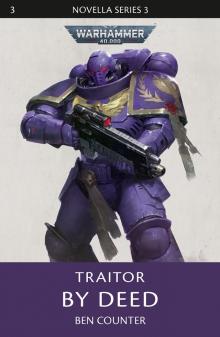 Traitor by Deed
Traitor by Deed Sacrifice
Sacrifice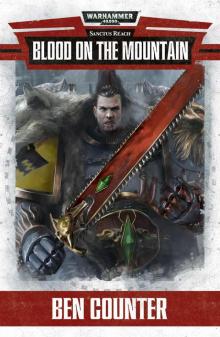 Blood on the Mountain
Blood on the Mountain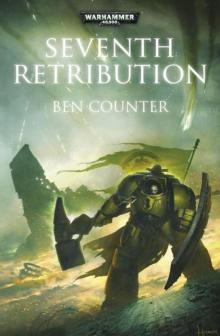 Seventh Retribution
Seventh Retribution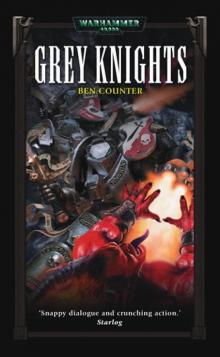 Grey Knights (Warhammer 40000)
Grey Knights (Warhammer 40000)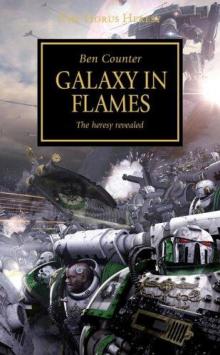 Galaxy in Flames
Galaxy in Flames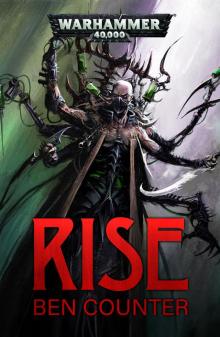 Rise – Ben Counter
Rise – Ben Counter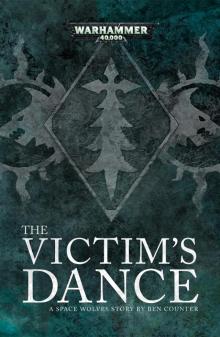 The Victim's Dance
The Victim's Dance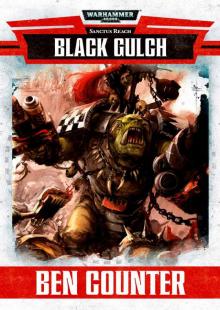 Black Gulch
Black Gulch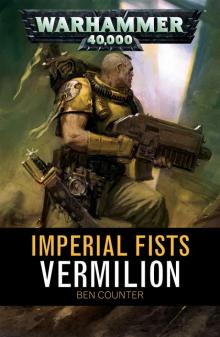 Vermilion
Vermilion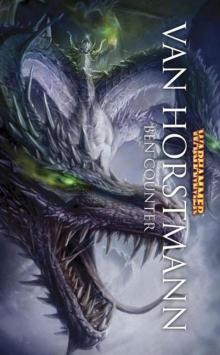 Van Horstmann
Van Horstmann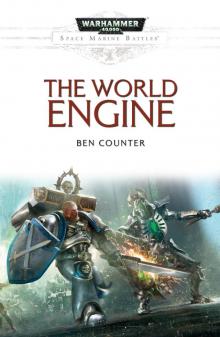 The World Engine
The World Engine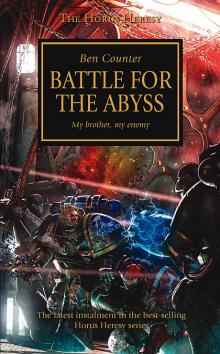 Battle for the Abyss
Battle for the Abyss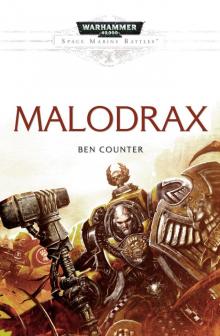 Malodrax
Malodrax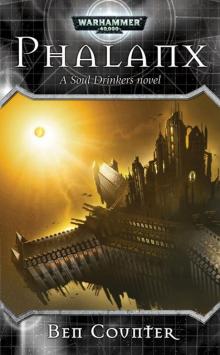 Soul Drinkers 06 - Phalanx
Soul Drinkers 06 - Phalanx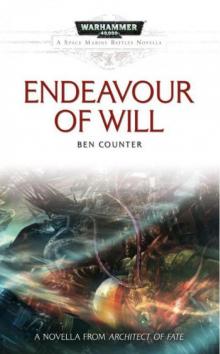 Endeavour of Will
Endeavour of Will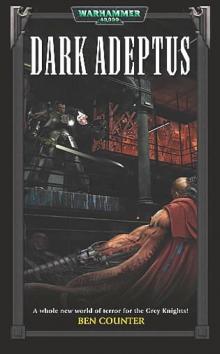 Dark Adeptus
Dark Adeptus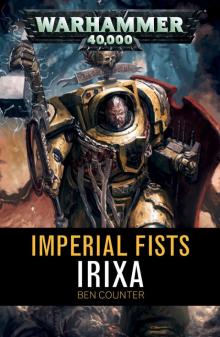 Irixa
Irixa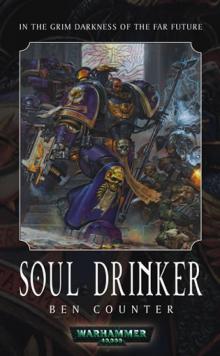 Soul Drinker
Soul Drinker